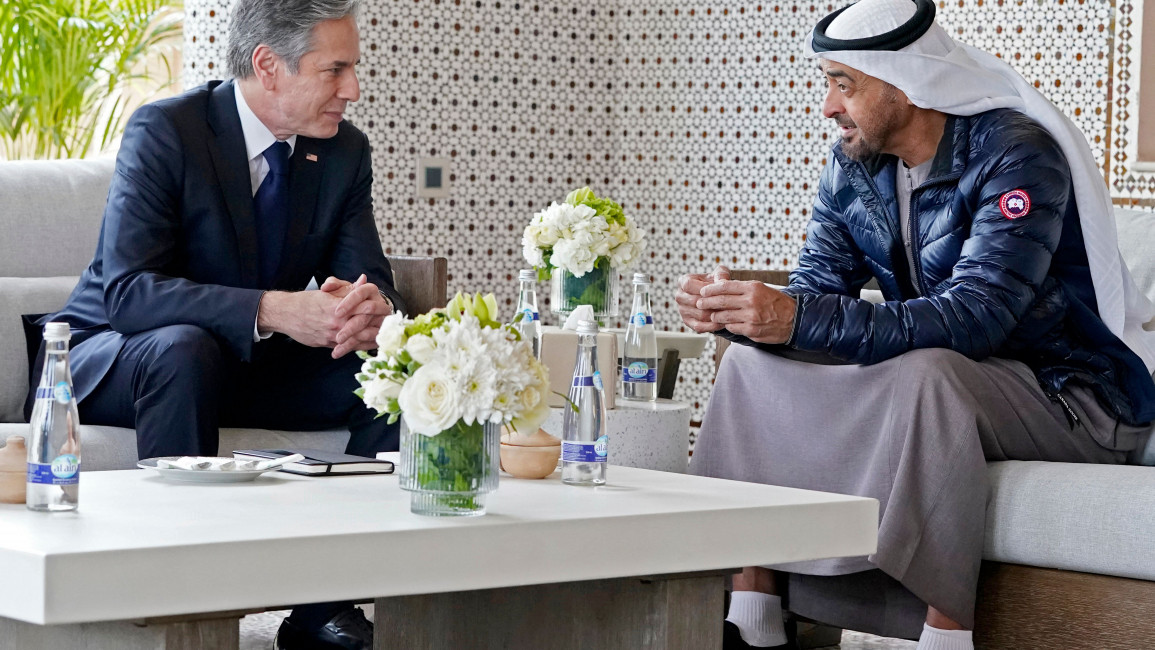US' Blinken assures UAE, Saudi Arabia of support against Houthi attacks
US Secretary of State Antony Blinken has assured Gulf leaders that Washington would assist in defending against missile and drone attacks by Yemen's Houthi rebels.
Saudi Arabia and the UAE have both been targets of Houthi missile and drone strikes.
In Rabat, @SecBlinken is meeting w/Abu Dhabi’s de-facto ruler MBZ amid super strained ties btw Washington and Gulf monarchies. Blinken mentioned Houthi attacks against UAE & Saudi. “We're determined to do everything we can to help you defend yourselves effectively against that” pic.twitter.com/4k0uAgpAsu
— Hümeyra Pamuk (@humeyra_pamuk) March 29, 2022
Blinken said the US was prepared to do "everything we can" to help the Gulf monarchies defend themselves against Houthi attacks, during a meeting in Morocco, according to Al Jazeera.
The Yemen rebels have stepped up strikes against both states in recent months.
The Iran-aligned Houthis have attacked multiple sites in Saudi Arabia and the UAE over the past few weeks.
Earlier this month, they reportedly struck civilian infrastructure facilities including a liquefied natural gas (LNG) plant, a water desalination plant, an oil facility, and a power station in Saudi Arabia.
Blinken's remarks come as Washington attempts to convince its allies in the region to condemn the Russian invasion of Ukraine.
He said the US was "encouraging partners to speak out against Russian aggression".
The UAE initially failed to condemn the Russian invasion of Ukraine, abstaining from a key vote in the UN at the start of the crisis.
Russia’s invasion has led to a massive rise in food and oil prices, disproportionately affecting countries that depend on imports, such as Morocco and Algeria.
"We're discussing concrete steps we can take … to help reduce the impact [of the fuel crisis], particularly on the most vulnerable populations," Blinken told journalists in Rabat.
UAE de-facto ruler Mohammed bin Zayed Al-Nahyan also attended talks in Morocco, with Abu Dhabi so far refusing to assist the US in stabilising prices by stepping up oil production.
Western diplomats have warned of mass starvation with food supply chains disrupted by the war in Ukraine, one of the world's biggest exporters of wheat.
The talks come as US and Israeli officials met UAE, Bahrain, Morocco, Egypt ministers - Arab countries that have normalised ties with Israel.
Jordan, which established relations with Israel in the 1990s, did not attend the summit.


![Minnesota Tim Walz is working to court Muslim voters. [Getty]](/sites/default/files/styles/image_684x385/public/2169747529.jpeg?h=a5f2f23a&itok=b63Wif2V)




![Debris near Rafic Hariri International Airport [Getty]](/sites/default/files/styles/image_330x185/public/2176162423.jpeg?h=a5f2f23a&itok=MCSK9mkM)
![An Israeli air strike on Jabalia killed teenage journalist Hassan Hamad [Screengrab/X]](/sites/default/files/styles/image_212x120/public/2024-10/hassan%20hamad1.jpg?h=c12e0b96&itok=KstD_5xk)
